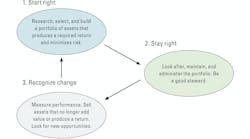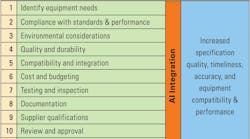Your selection of suppliers, support organizations, and information sources will probably be one of the most important sets of decisions you will make. Think of these work relationships as any other management tool: They must be carefully chosen and developed.
Excellent relationships don’t happen by luck. Building and fostering good relationships is like a marriage. It takes continuous work from both parties. Equipment executives know that all products are not the same, so we know to expect prices to vary with quality. We shouldn’t beat up our best supplier and expect him to match the prices of a product of lesser quality. Sure, there is no status in overpaying, but some combination of trust, loyalty and fairness breeds good relationships. Spend the energy to cultivate and nurture those relationships. If your company has a newsletter, put your suppliers on the mailing list. Have a “supplier appreciation day” lunch at your facility. Write your supplier a personal thank you letter for exceptional work. Building a user-supplier relationship is always a two-way street.
Let’s put those relationships into three groups and examine how you can make them work for your company.
Relationships with whole-goods suppliers: This is the biggest and probably the easiest group to manage. You should have a standardized fleet so you have a limited number of brands and models. Obviously, the larger the volume with any one brand, the larger the potential for discounts. Don’t forget to factor in the value of an OEM major-account program, which might include things such as additional discounts or extended warranty. Vehicle suppliers such as Ford and Chevrolet have OEM major-account fleet programs. Carefully select one or two large rental houses for your short-term rental business.
Choosing brands with strong product-support dealers makes sense. Seek out and develop relationships with a well-established auctioneer and fuel supplier. Fuel (and sex) is like air; it’s not important until you’re not getting any.
Relationships with product-support suppliers: This is a more difficult group to manage. Seek out and work with a limited number, say two or three, dealer service centers. Choose one or two tire, retreader and undercarriage partners. Choose a lubricant supplier, a battery supplier, a filter supplier, at least one non-OEM parts supplier, a hardware supplier, a welding/fabrication shop, a radiator repair shop, an OSHA-approved painter, and a safety products supplier. Don’t forget to select an oil analysis lab and a grade-control firm.
The more equipment support you self-perform will obviously reduce the amount of work you outsource. I prefer to outsource things such as hydraulic repair work and engine rebuild work because my shops usually did not have expensive test benches and dynamometers. The consequences of a self-performed failure were high if I couldn’t do a complete test of an expensive rebuilt component.
Make it your business to personally know the owner or a senior manager of all your major suppliers. Occasionally get in your car and visit your suppliers’ places of business.
Relationships with information sources: This is the relationship group that usually gets overlooked. It includes the vocational-technical schools, electronic and print media publications such as Construction Equipment magazine, your software systems supplier, and a respected executive search firm. Lastly, don’t forget the value of networking with your peers in associations such as AEMP, AGC or CFMA. When you need help or an outside perspective, knowing someone to call can be invaluable.
Building relationships today makes life a lot easier tomorrow. Think about it.




